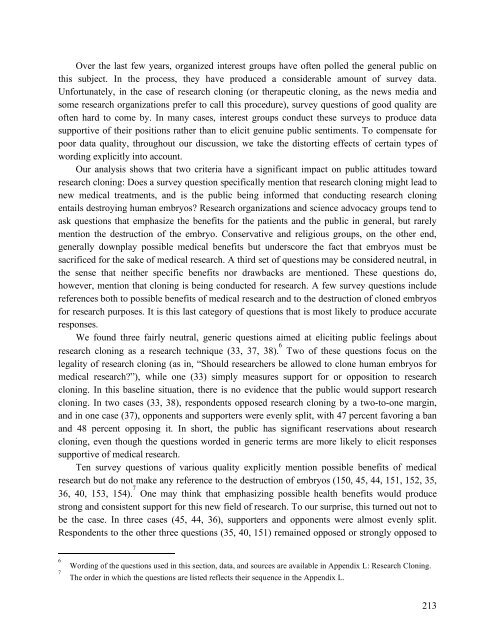Final Report (all chapters)
Final Report (all chapters)
Final Report (all chapters)
You also want an ePaper? Increase the reach of your titles
YUMPU automatically turns print PDFs into web optimized ePapers that Google loves.
Over the last few years, organized interest groups have often polled the general public on<br />
this subject. In the process, they have produced a considerable amount of survey data.<br />
Unfortunately, in the case of research cloning (or therapeutic cloning, as the news media and<br />
some research organizations prefer to c<strong>all</strong> this procedure), survey questions of good quality are<br />
often hard to come by. In many cases, interest groups conduct these surveys to produce data<br />
supportive of their positions rather than to elicit genuine public sentiments. To compensate for<br />
poor data quality, throughout our discussion, we take the distorting effects of certain types of<br />
wording explicitly into account.<br />
Our analysis shows that two criteria have a significant impact on public attitudes toward<br />
research cloning: Does a survey question specific<strong>all</strong>y mention that research cloning might lead to<br />
new medical treatments, and is the public being informed that conducting research cloning<br />
entails destroying human embryos? Research organizations and science advocacy groups tend to<br />
ask questions that emphasize the benefits for the patients and the public in general, but rarely<br />
mention the destruction of the embryo. Conservative and religious groups, on the other end,<br />
gener<strong>all</strong>y downplay possible medical benefits but underscore the fact that embryos must be<br />
sacrificed for the sake of medical research. A third set of questions may be considered neutral, in<br />
the sense that neither specific benefits nor drawbacks are mentioned. These questions do,<br />
however, mention that cloning is being conducted for research. A few survey questions include<br />
references both to possible benefits of medical research and to the destruction of cloned embryos<br />
for research purposes. It is this last category of questions that is most likely to produce accurate<br />
responses.<br />
We found three fairly neutral, generic questions aimed at eliciting public feelings about<br />
research cloning as a research technique (33, 37, 38). 6 Two of these questions focus on the<br />
legality of research cloning (as in, “Should researchers be <strong>all</strong>owed to clone human embryos for<br />
medical research?”), while one (33) simply measures support for or opposition to research<br />
cloning. In this baseline situation, there is no evidence that the public would support research<br />
cloning. In two cases (33, 38), respondents opposed research cloning by a two-to-one margin,<br />
and in one case (37), opponents and supporters were evenly split, with 47 percent favoring a ban<br />
and 48 percent opposing it. In short, the public has significant reservations about research<br />
cloning, even though the questions worded in generic terms are more likely to elicit responses<br />
supportive of medical research.<br />
Ten survey questions of various quality explicitly mention possible benefits of medical<br />
research but do not make any reference to the destruction of embryos (150, 45, 44, 151, 152, 35,<br />
36, 40, 153, 154). 7 One may think that emphasizing possible health benefits would produce<br />
strong and consistent support for this new field of research. To our surprise, this turned out not to<br />
be the case. In three cases (45, 44, 36), supporters and opponents were almost evenly split.<br />
Respondents to the other three questions (35, 40, 151) remained opposed or strongly opposed to<br />
6<br />
7<br />
Wording of the questions used in this section, data, and sources are available in Appendix L: Research Cloning.<br />
The order in which the questions are listed reflects their sequence in the Appendix L.<br />
213


